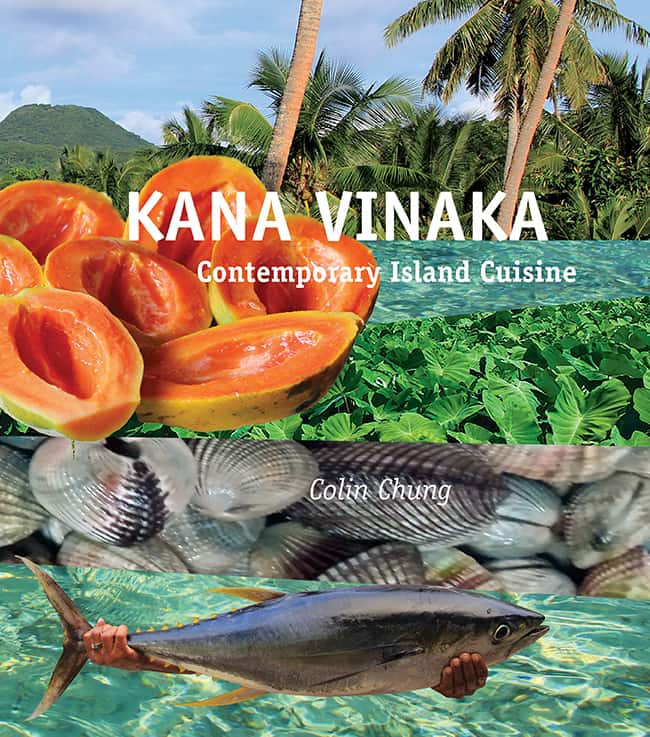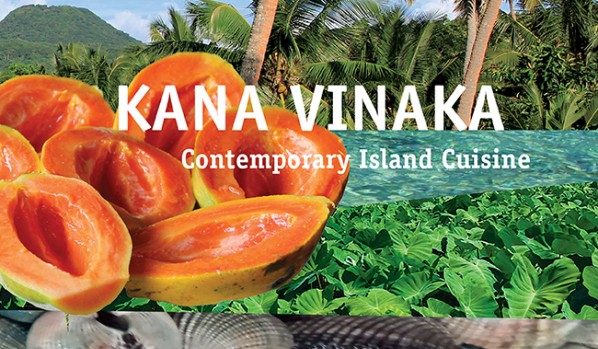Kana Vinaka means “eat well or good food” in Fijian, and is the title of Colin Chung’s new book about contemporary island cuisine. Throughout his forty years teaching and consulting in the islands, Colin has always promoted the use of fresh, local produce and the development of a more contemporary style of cuisine using the outstanding local produce.
Kana Vinaka is a not-for-profit initiative by Colin and a project he has taken on in the hopes of providing lasting development for the tourism and hospitality industry in Fiji, as well as, changing the way locals eat in their own country: healthy, sustainable and lowering dependence on imports and promoting the growth and vibrancy of the economy.
Colin said, “I just want to increase consumption of Fijian local produce and for people to eat healthy. The book is Fiji-centric for a couple of reasons.”
“The country offers the right setting with a wide range of good resources — seafood, dairy, poultry, pork, beef, goats, fish varieties and natural and planted fruit and vegetables.”
Chung said he had been visiting Fiji since 1974 and had made many friends, associates and connections, so it was natural to have started the book in Fiji.
“The great visitor industry growth here over the last 20-30 years, the beautiful and friendly people and the willingness of Government and NGOs to assist and work together has also helped,” he said.
The book is laid out in an easy-to-read format with pictures accompanying the recipes.
Photographed on site and in Chung’s kitchen, it was designed by a New Zealand artist and liberally uses Fijian motifs such as the masi and voivoi mat designs.
The Kana Vinaka was funded by the late Fiji-based nutritionist Susan Parkinson’s trust and the bulk of the production cost was underwritten by the Fijian Government’s Ministry of Agriculture.
The book was launched in Fiji in April this year and it is now available in Fiji, Australia and New Zealand.
 The Kana Vinaka costs $NZ50 ($F73) and the author had wanted the book to be cheap so it can be adopted in schools and educational institutions. It can be purchased online.
The Kana Vinaka costs $NZ50 ($F73) and the author had wanted the book to be cheap so it can be adopted in schools and educational institutions. It can be purchased online.
The Fijian Government has taken that on board and is in the process of distributing it in educational institutions.
The Hawaiian-born chef has travelled the Pacific Islands for several years as a hospitality consultant and trainer.
He moved from his homeland to New Zealand in the 1980s where he has run several successful cafes and bars, including the legendary Vinnies in Raglan, about 150km south-west of Auckland.
Besides advising major hospitality establishments, he has conducted training for Pacific chefs through NGOs and Pacific based-organisations such as SPTO (South Pacific Tourism Organisation), APTC (Australia Pacific Training College) and Pacific TAFE besides others.
Compiling the 102-page recipe book took him five years while he saved recipes and validated techniques, developing strategies, concepts and philosophies for his training programs across the Pacific.
The inspiration for the book came from the poor menus that he encountered, especially in the small locally-owned establishments; about 80 per cent proportion of foods that is imported into the islands to both feed the tourists and the locals alike and the resultant high level of non-communicable diseases (NCDs) in the islands.
The high content of processed, salt and sugar-laden imported foods in the islands was what prompted Chung to compile recipes, both traditional and modern, around the naturally nutritious foods abundantly available locally in Fiji and the region.

